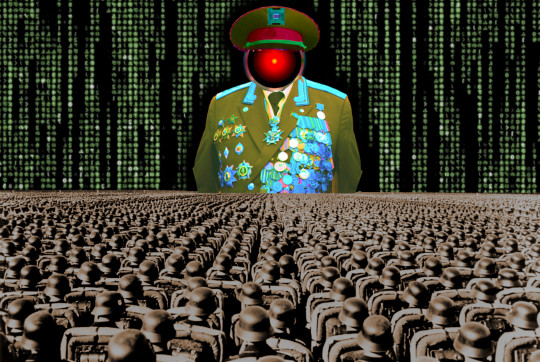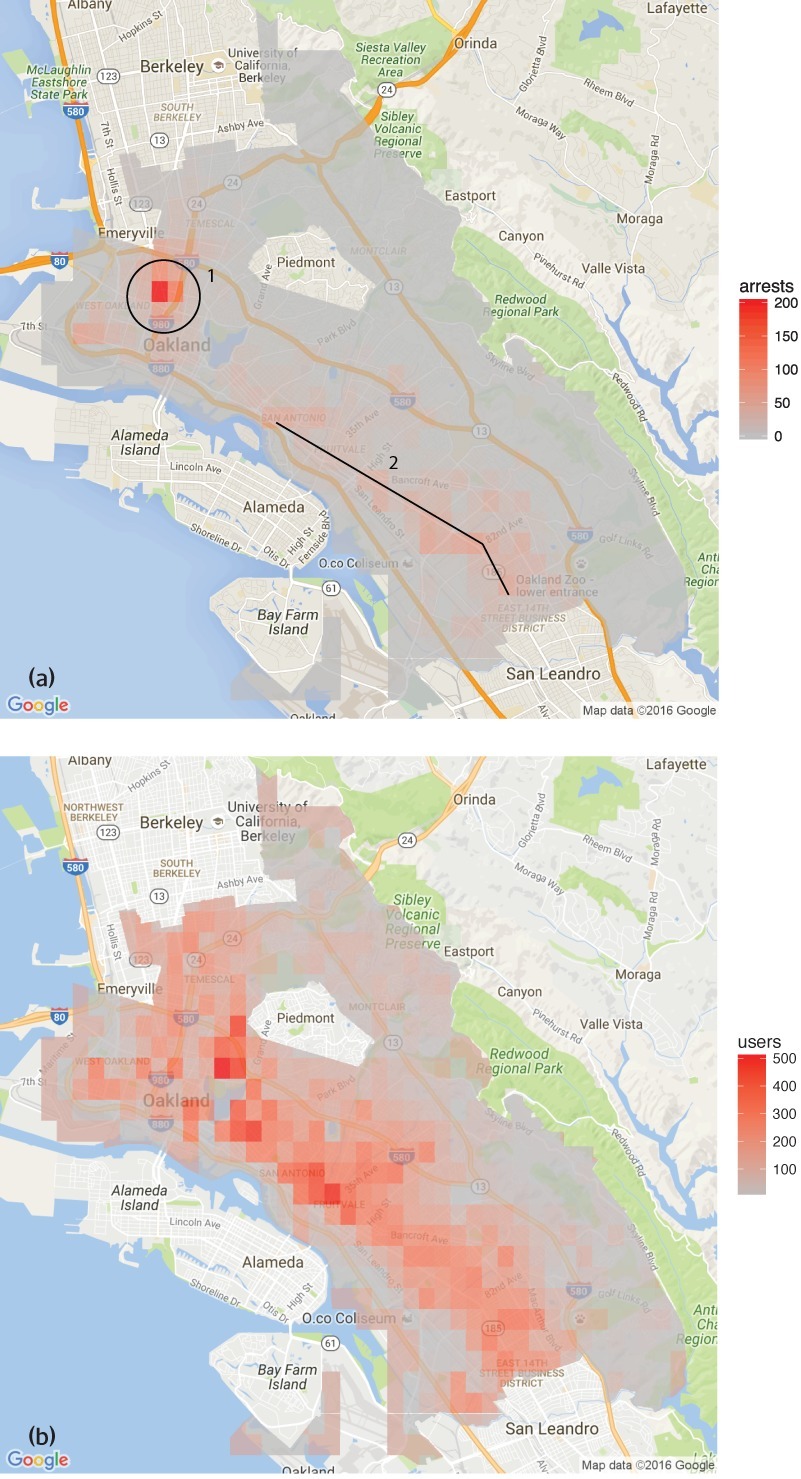#GIGO
Explore tagged Tumblr posts
Text
The surprising truth about data-driven dictatorships

Here’s the “dictator’s dilemma”: they want to block their country’s frustrated elites from mobilizing against them, so they censor public communications; but they also want to know what their people truly believe, so they can head off simmering resentments before they boil over into regime-toppling revolutions.
These two strategies are in tension: the more you censor, the less you know about the true feelings of your citizens and the easier it will be to miss serious problems until they spill over into the streets (think: the fall of the Berlin Wall or Tunisia before the Arab Spring). Dictators try to square this circle with things like private opinion polling or petition systems, but these capture a small slice of the potentially destabiziling moods circulating in the body politic.
Enter AI: back in 2018, Yuval Harari proposed that AI would supercharge dictatorships by mining and summarizing the public mood — as captured on social media — allowing dictators to tack into serious discontent and diffuse it before it erupted into unequenchable wildfire:
https://www.theatlantic.com/magazine/archive/2018/10/yuval-noah-harari-technology-tyranny/568330/
Harari wrote that “the desire to concentrate all information and power in one place may become [dictators] decisive advantage in the 21st century.” But other political scientists sharply disagreed. Last year, Henry Farrell, Jeremy Wallace and Abraham Newman published a thoroughgoing rebuttal to Harari in Foreign Affairs:
https://www.foreignaffairs.com/world/spirals-delusion-artificial-intelligence-decision-making
They argued that — like everyone who gets excited about AI, only to have their hopes dashed — dictators seeking to use AI to understand the public mood would run into serious training data bias problems. After all, people living under dictatorships know that spouting off about their discontent and desire for change is a risky business, so they will self-censor on social media. That’s true even if a person isn’t afraid of retaliation: if you know that using certain words or phrases in a post will get it autoblocked by a censorbot, what’s the point of trying to use those words?
The phrase “Garbage In, Garbage Out” dates back to 1957. That’s how long we’ve known that a computer that operates on bad data will barf up bad conclusions. But this is a very inconvenient truth for AI weirdos: having given up on manually assembling training data based on careful human judgment with multiple review steps, the AI industry “pivoted” to mass ingestion of scraped data from the whole internet.
But adding more unreliable data to an unreliable dataset doesn’t improve its reliability. GIGO is the iron law of computing, and you can’t repeal it by shoveling more garbage into the top of the training funnel:
https://memex.craphound.com/2018/05/29/garbage-in-garbage-out-machine-learning-has-not-repealed-the-iron-law-of-computer-science/
When it comes to “AI” that’s used for decision support — that is, when an algorithm tells humans what to do and they do it — then you get something worse than Garbage In, Garbage Out — you get Garbage In, Garbage Out, Garbage Back In Again. That’s when the AI spits out something wrong, and then another AI sucks up that wrong conclusion and uses it to generate more conclusions.
To see this in action, consider the deeply flawed predictive policing systems that cities around the world rely on. These systems suck up crime data from the cops, then predict where crime is going to be, and send cops to those “hotspots” to do things like throw Black kids up against a wall and make them turn out their pockets, or pull over drivers and search their cars after pretending to have smelled cannabis.
The problem here is that “crime the police detected” isn’t the same as “crime.” You only find crime where you look for it. For example, there are far more incidents of domestic abuse reported in apartment buildings than in fully detached homes. That’s not because apartment dwellers are more likely to be wife-beaters: it’s because domestic abuse is most often reported by a neighbor who hears it through the walls.
So if your cops practice racially biased policing (I know, this is hard to imagine, but stay with me /s), then the crime they detect will already be a function of bias. If you only ever throw Black kids up against a wall and turn out their pockets, then every knife and dime-bag you find in someone’s pockets will come from some Black kid the cops decided to harass.
That’s life without AI. But now let’s throw in predictive policing: feed your “knives found in pockets” data to an algorithm and ask it to predict where there are more knives in pockets, and it will send you back to that Black neighborhood and tell you do throw even more Black kids up against a wall and search their pockets. The more you do this, the more knives you’ll find, and the more you’ll go back and do it again.
This is what Patrick Ball from the Human Rights Data Analysis Group calls “empiricism washing”: take a biased procedure and feed it to an algorithm, and then you get to go and do more biased procedures, and whenever anyone accuses you of bias, you can insist that you’re just following an empirical conclusion of a neutral algorithm, because “math can’t be racist.”
HRDAG has done excellent work on this, finding a natural experiment that makes the problem of GIGOGBI crystal clear. The National Survey On Drug Use and Health produces the gold standard snapshot of drug use in America. Kristian Lum and William Isaac took Oakland’s drug arrest data from 2010 and asked Predpol, a leading predictive policing product, to predict where Oakland’s 2011 drug use would take place.

[Image ID: (a) Number of drug arrests made by Oakland police department, 2010. (1) West Oakland, (2) International Boulevard. (b) Estimated number of drug users, based on 2011 National Survey on Drug Use and Health]
Then, they compared those predictions to the outcomes of the 2011 survey, which shows where actual drug use took place. The two maps couldn’t be more different:
https://rss.onlinelibrary.wiley.com/doi/full/10.1111/j.1740-9713.2016.00960.x
Predpol told cops to go and look for drug use in a predominantly Black, working class neighborhood. Meanwhile the NSDUH survey showed the actual drug use took place all over Oakland, with a higher concentration in the Berkeley-neighboring student neighborhood.
What’s even more vivid is what happens when you simulate running Predpol on the new arrest data that would be generated by cops following its recommendations. If the cops went to that Black neighborhood and found more drugs there and told Predpol about it, the recommendation gets stronger and more confident.
In other words, GIGOGBI is a system for concentrating bias. Even trace amounts of bias in the original training data get refined and magnified when they are output though a decision support system that directs humans to go an act on that output. Algorithms are to bias what centrifuges are to radioactive ore: a way to turn minute amounts of bias into pluripotent, indestructible toxic waste.
There’s a great name for an AI that’s trained on an AI’s output, courtesy of Jathan Sadowski: “Habsburg AI.”
And that brings me back to the Dictator’s Dilemma. If your citizens are self-censoring in order to avoid retaliation or algorithmic shadowbanning, then the AI you train on their posts in order to find out what they’re really thinking will steer you in the opposite direction, so you make bad policies that make people angrier and destabilize things more.
Or at least, that was Farrell(et al)’s theory. And for many years, that’s where the debate over AI and dictatorship has stalled: theory vs theory. But now, there’s some empirical data on this, thanks to the “The Digital Dictator’s Dilemma,” a new paper from UCSD PhD candidate Eddie Yang:
https://www.eddieyang.net/research/DDD.pdf
Yang figured out a way to test these dueling hypotheses. He got 10 million Chinese social media posts from the start of the pandemic, before companies like Weibo were required to censor certain pandemic-related posts as politically sensitive. Yang treats these posts as a robust snapshot of public opinion: because there was no censorship of pandemic-related chatter, Chinese users were free to post anything they wanted without having to self-censor for fear of retaliation or deletion.
Next, Yang acquired the censorship model used by a real Chinese social media company to decide which posts should be blocked. Using this, he was able to determine which of the posts in the original set would be censored today in China.
That means that Yang knows that the “real” sentiment in the Chinese social media snapshot is, and what Chinese authorities would believe it to be if Chinese users were self-censoring all the posts that would be flagged by censorware today.
From here, Yang was able to play with the knobs, and determine how “preference-falsification” (when users lie about their feelings) and self-censorship would give a dictatorship a misleading view of public sentiment. What he finds is that the more repressive a regime is — the more people are incentivized to falsify or censor their views — the worse the system gets at uncovering the true public mood.
What’s more, adding additional (bad) data to the system doesn’t fix this “missing data” problem. GIGO remains an iron law of computing in this context, too.
But it gets better (or worse, I guess): Yang models a “crisis” scenario in which users stop self-censoring and start articulating their true views (because they’ve run out of fucks to give). This is the most dangerous moment for a dictator, and depending on the dictatorship handles it, they either get another decade or rule, or they wake up with guillotines on their lawns.
But “crisis” is where AI performs the worst. Trained on the “status quo” data where users are continuously self-censoring and preference-falsifying, AI has no clue how to handle the unvarnished truth. Both its recommendations about what to censor and its summaries of public sentiment are the least accurate when crisis erupts.
But here’s an interesting wrinkle: Yang scraped a bunch of Chinese users’ posts from Twitter — which the Chinese government doesn’t get to censor (yet) or spy on (yet) — and fed them to the model. He hypothesized that when Chinese users post to American social media, they don’t self-censor or preference-falsify, so this data should help the model improve its accuracy.
He was right — the model got significantly better once it ingested data from Twitter than when it was working solely from Weibo posts. And Yang notes that dictatorships all over the world are widely understood to be scraping western/northern social media.
But even though Twitter data improved the model’s accuracy, it was still wildly inaccurate, compared to the same model trained on a full set of un-self-censored, un-falsified data. GIGO is not an option, it’s the law (of computing).
Writing about the study on Crooked Timber, Farrell notes that as the world fills up with “garbage and noise” (he invokes Philip K Dick’s delighted coinage “gubbish”), “approximately correct knowledge becomes the scarce and valuable resource.”
https://crookedtimber.org/2023/07/25/51610/
This “probably approximately correct knowledge” comes from humans, not LLMs or AI, and so “the social applications of machine learning in non-authoritarian societies are just as parasitic on these forms of human knowledge production as authoritarian governments.”

The Clarion Science Fiction and Fantasy Writers’ Workshop summer fundraiser is almost over! I am an alum, instructor and volunteer board member for this nonprofit workshop whose alums include Octavia Butler, Kim Stanley Robinson, Bruce Sterling, Nalo Hopkinson, Kameron Hurley, Nnedi Okorafor, Lucius Shepard, and Ted Chiang! Your donations will help us subsidize tuition for students, making Clarion — and sf/f — more accessible for all kinds of writers.

Libro.fm is the indie-bookstore-friendly, DRM-free audiobook alternative to Audible, the Amazon-owned monopolist that locks every book you buy to Amazon forever. When you buy a book on Libro, they share some of the purchase price with a local indie bookstore of your choosing (Libro is the best partner I have in selling my own DRM-free audiobooks!). As of today, Libro is even better, because it’s available in five new territories and currencies: Canada, the UK, the EU, Australia and New Zealand!

[Image ID: An altered image of the Nuremberg rally, with ranked lines of soldiers facing a towering figure in a many-ribboned soldier's coat. He wears a high-peaked cap with a microchip in place of insignia. His head has been replaced with the menacing red eye of HAL9000 from Stanley Kubrick's '2001: A Space Odyssey.' The sky behind him is filled with a 'code waterfall' from 'The Matrix.']

Image: Cryteria (modified) https://commons.wikimedia.org/wiki/File:HAL9000.svg
CC BY 3.0 https://creativecommons.org/licenses/by/3.0/deed.en
—
Raimond Spekking (modified) https://commons.wikimedia.org/wiki/File:Acer_Extensa_5220_-_Columbia_MB_06236-1N_-_Intel_Celeron_M_530_-_SLA2G_-_in_Socket_479-5029.jpg
CC BY-SA 4.0 https://creativecommons.org/licenses/by-sa/4.0/deed.en
—
Russian Airborne Troops (modified) https://commons.wikimedia.org/wiki/File:Vladislav_Achalov_at_the_Airborne_Troops_Day_in_Moscow_%E2%80%93_August_2,_2008.jpg
“Soldiers of Russia” Cultural Center (modified) https://commons.wikimedia.org/wiki/File:Col._Leonid_Khabarov_in_an_everyday_service_uniform.JPG
CC BY-SA 3.0 https://creativecommons.org/licenses/by-sa/3.0/deed.en
#pluralistic#habsburg ai#self censorship#henry farrell#digital dictatorships#machine learning#dictator's dilemma#eddie yang#preference falsification#political science#training bias#scholarship#spirals of delusion#algorithmic bias#ml#Fully automated data driven authoritarianism#authoritarianism#gigo#garbage in garbage out garbage back in#gigogbi#yuval noah harari#gubbish#pkd#philip k dick#phildickian
831 notes
·
View notes
Text





been playing bg3 for a hot minute, so it's about time i introduce mine and my partner's characters: CHUGG the dwarf druid (he/they) and GIGO the dragonborn monk (they/them).
while chugg is the earnest diplomat of the group, gigo is an amnesiac curious about the world around them in the same way a kid who kills bugs in increasingly distressing ways is (except they're an adult killing other adults, so it's a little less cute).
maybe the two aren't the most functional team, but at least chugg's druidic sensibilities make gigo's dark urges easy to ignore. they're just a big lizard, that's aaaaaall. probably nothing else going on with them to worry about.
#bg3#baldur's gate 3#durge#tav#dnd#dragonborn#dwarf#comic#fanart#original#2d#2024#chugg#gigo#the chugg and gigo show#long post#evulart
125 notes
·
View notes
Text
The vibrant and bustling nightlife of Kabukicho 🕹️👾🎮

#City Lights#Street Scene#Rainy Night#Night Lights#Video Games#Nightlife#Rain#Gaming#Sega#Gigo#Shinjuku#Kabukicho#Tokyo#Japan
73 notes
·
View notes
Video
tumblr
Cyber Troopers Virtual-On Force + Oratorio Tangram @ GiGO 3 Akiba Tokyo Japan
#Cyber Troopers Virtual-On#Virtual-On Force#Virtual-On Oratorio Tangram#Virtual-On#VirtualOn#virtual on#cyber troopers#arcade games#robots#mechs#mech game#futuristic games#sega#hitmaker#AM3#GiGO#jpn2023
110 notes
·
View notes
Text

If you put garbage into an AI, you will get garbage out of an AI.
And we have put garbage into the AIs. 🤖🗑️
#glue#pizza#artificial intelligence#ai#ai overview#google ai overview#technology#garbage in garbage out#GIGO#model collapse#ai hallucinations
47 notes
·
View notes
Text

Lycoris Recoil - GiGO Pop Up Shop featuring goods with new illustrations from 11 January 2025 [Brand: Caravan]
13 notes
·
View notes
Text

The Genshin outfit of the day is:
Xingqiu from the GiGo collab!
9 notes
·
View notes
Text

GiGO. Akihabara. Chiyoda City. Tokyo, Japan.
23 notes
·
View notes
Text
New Tamagotchi Crane Game Prizes Available at GiGO Arcade’s in Japan This October

Looks like there’s some new prizes hitting the 67 arcade locations in Japan! The upcoming prize has just been listed on the official GENDA GiGo Entertainment website and they’re super cute! There are three characters which include Mametchi, Kuchipatchi, and Oyajitchi. Mametchi actually has two expressions, one in regular form, and the other more joyous!
They all featured ball chains stitched to the top of their heads you can wear them anywhere. These prizes are set to hit GiGO arcade locations throughout Japan starting on Wednesday, October 11th, 2023.
#tamapalace#tamagotchi#tmgc#tamatag#virtualpet#bandai#gigo#gendagigoentertainement#genda gigo entertainment#prizes#arcade#jp#japan
37 notes
·
View notes
Text

So I won this prize in the Gigo crane game ☺️👒
Gear 5th Luffy ❤️
#Luffy#monkey d. ruffy#monkey d. luffy#ONE PIECE#Tokyo#gigo#crane game#anime#gear 5 luffy#gear 5th#straw hat pirates#one piece luffy#opla#one piece live action#eiichiro oda#Oda sensei#figurine#king of artists#anime figure
25 notes
·
View notes
Text





Attack on Titan x GiGo Final Memories Event Character Illustration
#shingeki no kyojin#attack on titan#levi ackerman#mikasa ackerman#eren jaeger#armin arlert#snk collabs#snk event#gigo
26 notes
·
View notes
Text


did a three way collab with @edgygender and @gothavi featuring our bg3 characters! we each started by sketching our own fella, then passing it along.
my goddd what a blast. everybody go look at what my friends made and then do this with your own friends ASAP. the power of collaborative art goes crazy
#bg3#durge#tav#dnd#fanart#for others#2024#gigo#2d#collab#don't we have the most perfect set of usernames. haw haw haw#evulart
15 notes
·
View notes
Text

MADE ANOTHER OBJECTSONA ^^ (prns it/its and ge/gim)
some facts about it under the readmore
Name pronunciation is Gee-go
Those wing-shaped branches can't actually be used for flight. On some rare occasions it'll grow leaves but it's not enough to carry gim off the ground.
If it stays in the same place for too long, ge'll start rooting into the ground. This can be averted if ge trims it's branch limbs every now and then. If ge doesn't, it'll get stuck and grow into a tree, which will produce more apples after some years.
The sharp teeth are just for show and mostly to scare away predators. It gets all of gis nutrients from photosynthesis. Ge will eat bugs for the flavor though.
40 notes
·
View notes
Photo

#sega#GiGO#Akiba#Akihabara#zpix#cyber troopers#Virtual On Force#VirtualOn#Virtual On#Virtual-On#Gunblade NY#L.A. Machineguns#LA Machineguns#The Ocean Hunter#Ocean Hunter#Aliens#lightgun games#lightgun game#lightguns#sega life#arcade#arcades#game center#game centers#tokyo#japan#jpn2023
82 notes
·
View notes
Text



12 notes
·
View notes
